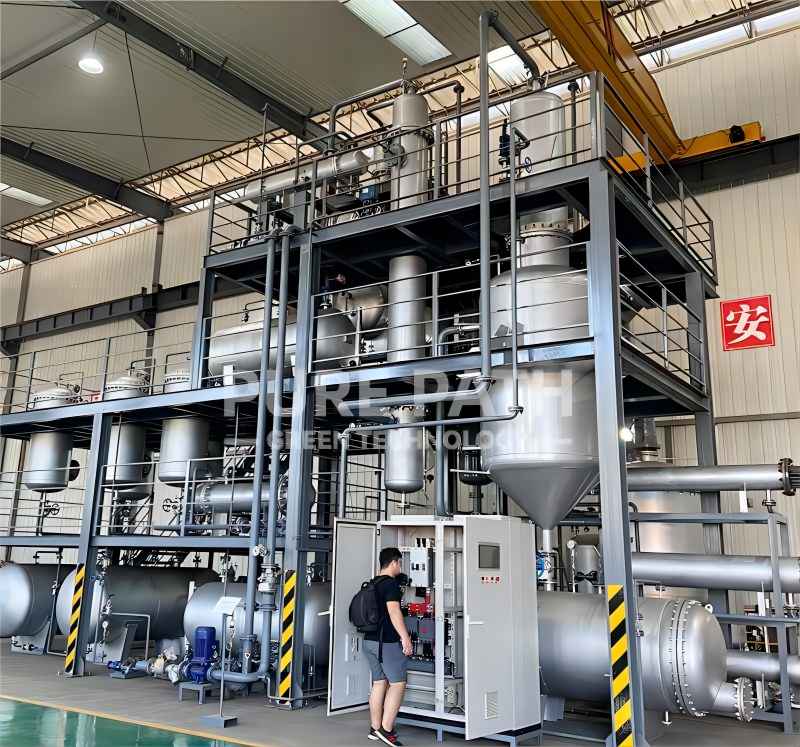Giving Used Engine Oil a Second Life: Recycling and Responsible Disposal
Used engine oil, a necessary byproduct of keeping our vehicles running smoothly, poses a significant environmental threat if not disposed of properly. Fortunately, responsible alternatives to tossing it in the trash exist through used engine oil recycling. This process not only protects the environment but also conserves valuable resources. This article explores the different methods of used engine oil recycling, the fate of used oil after collection, and what materials can and cannot be mixed with used oil for recycling.

Why Recycle Used Engine Oil?
Used engine oil, while appearing unharmful, is classified as hazardous waste due to the potential environmental risks it poses. It contains a complex mixture of chemicals, including:
- Base oils: These are the lubricating components of the oil, derived from crude oil.
- Additives: These enhance the performance properties of the oil, such as anti-wear agents, detergents, and viscosity modifiers.
Some of these components, particularly certain additives containing heavy metals, can be harmful to the environment if not disposed of properly. When improperly disposed of, used engine oil can:
- Contaminate soil and water: If dumped on the ground or poured down drains, the oil can seep into the soil and contaminate groundwater. This contamination can harm plant and animal life, disrupt ecosystems, and potentially render water sources unsafe for drinking or irrigation.
- Harm wildlife: Animals exposed to used oil, either through direct contact or by ingesting contaminated water or food, can suffer various health problems, including organ damage, reproductive issues, and even death.
Extracting crude oil, the primary source of virgin engine oil, is an energy-intensive process that also has environmental consequences. It involves:
- Drilling: This process can disrupt ecosystems and damage landscapes.
- Transportation: Moving large quantities of crude oil over long distances carries the risk of spills and leaks, which can harm the environment.
- Refining: The refining process consumes significant energy and can generate air and water pollution.
Recycling used engine oil offers a more sustainable alternative to using virgin oil by:
- Reducing reliance on virgin oil extraction: By re-refining used oil, the demand for new crude oil is reduced, minimizing the environmental impact associated with drilling and refining activities.
- Conserving resources: Recycling used oil conserves a valuable resource, as it can be repurposed into new lubricants or other usable products, reducing the need to extract and refine virgin oil.
- Protecting the environment: Proper recycling prevents harmful contaminants from entering the environment, safeguarding soil, water, and wildlife habitats, and contributing to a cleaner and healthier environment for all.
Recycling of Used Engine Oil by Different Solvents
The effectiveness of used oil recycling depends heavily on the chosen solvent. This section dives deeper into some commonly used solvents and the factors influencing their selection:
Common Solvents
- N-Methyl-2-pyrrolidone (NMP): This solvent is popular due to its high selectivity, meaning it effectively separates the desired oil fractions from contaminants. It also boasts high efficiency, achieving a good extraction yield. However, NMP requires specific handling procedures due to potential health and environmental concerns.
- Propane: Gaining traction in the industry, propane is a readily available and environmentally friendly option. It excels at extracting specific oil fractions ideal for re-refining into high-quality lubricants.
- Solvent Mixtures: Combining different solvents, such as NMP with aromatic solvents, can offer a compromise between efficiency and environmental impact. However, this approach requires careful control of the mixing process and responsible management of the solvent mixture throughout its lifecycle.
Factors Affecting Solvent Selection
- Desired Oil Quality: Different solvents have varying degrees of selectivity, meaning they extract different types and amounts of oil fractions. Choosing the right solvent depends on the specific oil quality requirements for the intended end product (e.g., high-quality lubricants vs. fuel blends).
- Economic Considerations: The cost of the solvent, its availability, and ease of use play a significant role in the selection process. Balancing these factors with desired oil quality and environmental impact is crucial.
- Environmental Impact: The potential environmental harm associated with the chosen solvent, including its toxicity, biodegradability, and disposal methods, are critical factors. Choosing solvents with minimal environmental impact and responsible disposal strategies is essential for sustainable recycling practices.

What Happens to Used Engine Oil After Recycling?
Used engine oil, after undergoing meticulous collection and processing through various recycling methods, finds new life in a variety of applications. Let’s explore some of the most common end products derived from recycled used engine oil:
1. Re-refined Base Oil: This product represents the highest quality output of the recycling process. Through rigorous re-refining, the oil is purified to meet the same standards and specifications as virgin base oil, making it suitable for various lubricating applications, including:
- Engine oils: Re-refined oil can be used to formulate high-quality engine oils for automobiles and other vehicles.
- Motor oils: Similar to engine oils, re-refined oil can be used in various motor oils for machinery and equipment.
- Industrial lubricants: This category encompasses a wide range of lubricants used in industrial settings, and re-refined oil can serve as a valuable and sustainable source for these applications.
2. Fuel Blending: In some cases, processed used oil can be blended with virgin fuel oil to create a usable fuel for industrial applications. This blended fuel can be used in:
- Boilers: These industrial heating systems often require fuel oil to generate heat for various purposes, and blended fuel derived from recycled oil can provide a sustainable alternative.
- Furnaces: Similar to boilers, industrial furnaces also utilize fuel oil for various heating applications, and blended fuel can offer an environmentally conscious solution.
3. Asphalt Production: The process of creating asphalt, the material used to pave roads and other surfaces, can incorporate recycled oil fractions. This not only reduces reliance on virgin materials but also provides a beneficial way to utilize recycled oil.
4. Other Applications: Beyond the aforementioned uses, recycled used engine oil can find additional applications in various sectors, including:
- Dust suppressants: Used oil can be processed into products that help control dust on roads, construction sites, and other areas.
- Metalworking fluids: Certain applications in metalworking can utilize recycled oil-based fluids, offering a sustainable alternative to traditional options.
- Feedstock for new chemicals: In some cases, recycled oil can serve as a raw material for the production of new chemicals, further extending its lifecycle and value.
What Can (and Cannot) Be Mixed with Used Engine Oil for Recycling?
It’s crucial to understand that only specific materials can be combined with used engine oil for recycling. Mixing incompatible substances can contaminate the oil, rendering it unusable and potentially causing environmental harm. Here’s a clear breakdown of acceptable and unacceptable materials:
Acceptable for Mixing
Used oil filters: Many recycling facilities accept used oil filters alongside used oil. However, it’s essential to ensure the filters are completely drained of any residual oil before collection. This allows for the separation and recycling of the metal components within the filter while keeping the oil stream uncontaminated.
Unacceptable for Mixing
- Antifreeze: This coolant contains distinct chemicals incompatible with used engine oil. Mixing them can contaminate the oil, rendering it unusable for recycling and potentially causing harm to the environment if improperly disposed of.
- Brake fluid: Similar to antifreeze, brake fluid has a unique chemical composition that can negatively impact the recycling process by introducing unwanted contaminants into the oil stream.
- Gasoline or diesel fuel: These flammable liquids pose a significant fire hazard when mixed with used oil. Their addition is strictly prohibited and can endanger personnel handling the oil during collection, transportation, and processing.
- Other household liquids: Avoid mixing any household liquids like oil paints, solvents, or cleaning products with used oil. These often contain harmful chemicals that can contaminate the oil stream and hinder the recycling process. Additionally, improper disposal of these liquids can pose environmental risks.
By adhering to these guidelines, individuals can significantly contribute to the safe and responsible recycling of used engine oil, promoting a cleaner and more sustainable environment for everyone.

Conclusion
Used engine oil recycling is a crucial component of a sustainable future. By understanding the various methods, their impact, and what not to mix with used oil, we can all play a part in protecting the environment and conserving resources for generations to come. Remember, responsible disposal starts with you!







